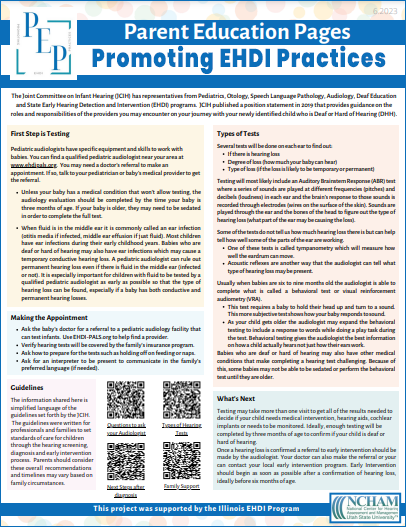Providing Support?
If you are an individual who is providing family-to-family support, and/or a program considering implementation of family-to-family support, the following are different models of family-to-family support programming, and/or qualities that those providing support should possess.
Models of Family-to-Family Support
Hands & Voices
Hands & Voices Family to Family Support - http://handsandvoices.org/index.htm
At Hands & Voices there are three basic components provided to families through our parent-to-parent organizational system: emotional support, information and resource dissemination, and modeling by other families. Supported families are emotionally healthy and ready to face their responsibilities. Informed families have the resources to make good decisions, take ownership of their decisions, and understand why they are doing what they are doing.

FL3 Office Hours
Office Hours is a place where family leaders providing direct support to families with children who are D/HH gather to share strategies and resources around planned topics facilitated by FL3 staff and invited guests.
Register Previous Topics
The Hands & Voices Family to Family Support Model
Additionally, Hands & Voices believes the following components should be in place for those providing parent-to-parent support:
- Supporting families without bias
- how to share personal stories in unbiased manner
- How to share information and resources for the full continuum of communication and educational options.
- Preparation for providing appropriate emotional support and acceptance of every family’s choices around communication options and other life choices.
- how to handle questions a family may ask
- Confidentiality standards and practices considerations.
- Functional understanding of formal systems and services available to families and their children in the state/territory/province where they live as well as National resources.
- On-going training
For more information on Hands & Voices Chapters -
Contact chaptersupport@handsandvoices.org
For more information on the Hands & Voices Guide By Your Side program -
Contact gbys@handsandvoices.org
Family-to-Family Support Program Guidelines
Guidelines for Establishing and Maintaining Family-to-Family Support Programs for Families who Have Children who are Deaf / Hard of Hearing (D/HH)
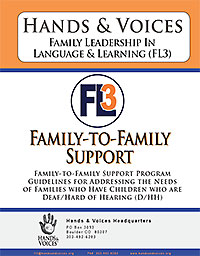 - Creating a family-to-family support program to serve families with children who are (D/HH) can be a challenging endeavor and requires careful planning, execution and evaluation. Programs must be built on the foundation of respect for informed parent decision-making and delivery of unbiased information to families.
- Creating a family-to-family support program to serve families with children who are (D/HH) can be a challenging endeavor and requires careful planning, execution and evaluation. Programs must be built on the foundation of respect for informed parent decision-making and delivery of unbiased information to families.
Whether you currently are operating a family-to-family support program with or without parent expertise in D/HH focused services and/or you are seeking to implement a program, we hope you find the guidelines informative and insightful. The Guidelines are designed as a resource for those interested in playing an active role in the development and implementation of high quality, sustainable parent-to-parent support unique for parents who have children who are Deaf/Hard of Hearing (D/HH). We believe underscoring core components of appropriate programming specifically for this population will provide consistent D/HH-focused support for all families.
The intended primary audience of these Guidelines are state/territory community organizations and organizers who wish to implement a family-to-family support program. (Hands & Voices chapters and programs such as the H&V Guide By your Side (GBYS) program already have written specific guiding principles and operating policies and procedures of which they follow).
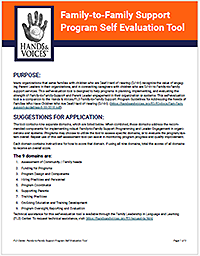
New! Family-to-Family Support Program Self Evaluation Tool
The Family-to-Family Support Program Self Evaluation Tool is a self-evaluation tool is designed to help programs in evaluating the strengths and opportunities for improvement of family support programming. The domains and rubrics follow the Guidelines for Establishing and Maintaining Family-to-Family Programs for Families who Have Children who are Deaf / Hard of Hearing (D/HH).
Family Support Training Resources
Quality family-to-family support programs have a D/HH specific training curriculum in place to provide consistent and superior support, tailored to the needs of families with children who are D/HH. The following document includes suggestions for resources and activities based on the training recommendations in the “Family-to-Family Support Guidelines.”
Family Support Training Resources
Hands & Voices Family Support Activities Guide
A guide that includes family support activities developed using the constructs of an evidence-based parent-to-parent support framework . In this guide you will find 160 unduplicated links to family support resources organized within the constructs of Child/Family Well-Being, Family Knowledge, and Family Empowerment. The guide also includes an easy-to-use visual index, an icon highlighting language and literacy family support activities, notes resources in other languages, and family learning outcomes.
[ Download Guide ]
[ Video Training on How to Use the Guide ]
[ PDF Tipsheet ]
Checklist: Program Implementation of Unbiased Support for Families With D/HH Children
Programs offering support to the entire community of families with children who are deaf and hard of hearing must be unbiased to the many choices families may make about communication, educational placement, technology and more. Unbiased delivery of information involves careful consideration of each program component and commitment to on-going assessment. The following checklist is provided as a tool to conduct a review of a family support program in order to develop a plan to address areas of need / improvement.
Family-to-Family Support Opportunities for Family Based Organizations
Description: The information in this document was created by the Hands & Voices Guide By Your Side (GBYS) Coordinators in response to the findings from the FL3 National Needs Assessment . These are examples of strategies and activities that Family-based Organizations (FBOs) may want to consider to proactively address what families reported in the FL3 Needs Assessment.
A Case for Direct Referrals to Parent-to-Parent Support Programs
A Case for Direct Referrals to Parent-to-Parent Support Programs provides guidance to EHDI system stakeholders including but not limited to; state/territory EHDI programs and family-led parent-to-parent support programs to increase the number of families who are offered parent-to-parent support, including those from underrepresented population. Programs offering local parent-to-parent support to families with children who are deaf and hard of hearing(D/HH) are most effective when they are able to reach all families, regardless of the family’s ability to initiate contact. Direct referrals from Early Hearing Detection and Intervention (EHDI) programs and diagnosing audiologists in a timely manner ensures health equity by providing all families access to trained parent-to-parent support providers who offer resources, information, and emotional support.
Parent Event Guide For Families with Children who are Deaf and Hard of Hearing
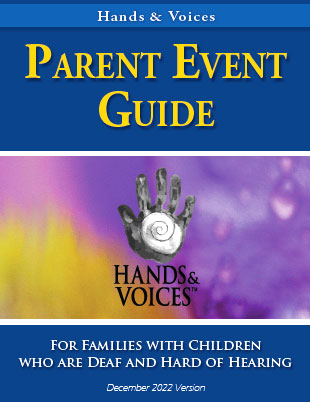 “Parent Event Guide For Families with Children who are Deaf and Hard of Hearing.” was created by Hands & Voices through the inspiration and financial support of the Commonwealth of the Northern Mariana Islands (CNMI) Early Hearing Detection and Intervention (EHDI). The experience of raising a child who is D/HH can be isolating, and parents who have limited experience with deafness may feel ill-equipped to make decisions for their child. Providing occasions where families can engage with other parents/caregivers and family members to exchange experiences while learning information helpful to their child’s development can be affirming and empowering. Examples of events in the Guide vary widely from simple social gatherings lasting a few hours with a limited budget and planning, to more complex, like a family conference lasting several days. Family-based organizations serving parents with children who are D/HH will enjoy the Guide’s tips for:
“Parent Event Guide For Families with Children who are Deaf and Hard of Hearing.” was created by Hands & Voices through the inspiration and financial support of the Commonwealth of the Northern Mariana Islands (CNMI) Early Hearing Detection and Intervention (EHDI). The experience of raising a child who is D/HH can be isolating, and parents who have limited experience with deafness may feel ill-equipped to make decisions for their child. Providing occasions where families can engage with other parents/caregivers and family members to exchange experiences while learning information helpful to their child’s development can be affirming and empowering. Examples of events in the Guide vary widely from simple social gatherings lasting a few hours with a limited budget and planning, to more complex, like a family conference lasting several days. Family-based organizations serving parents with children who are D/HH will enjoy the Guide’s tips for:
- Creating a Culture of Support
- Event Preparation (planning committees, cultural and DHH Plus considerations, DHH adult involvement, accessibility…)
- Event Execution (registration, children’s activities, social media promotion, volunteer management…)
- Event Follow-Up (evaluation, reporting, project management…)
- Specific Event Considerations (panel facilitation, “day in the park”, mom’s retreat, camp…)
- Addendum of Samples/Templates (donation tracking, volunteer agreements, flyers, photo release forms…)
Promoting EHDI Practices (PEP)
The Illinois EHDI program, in partnership with NCHAM, created the Promoting EHDI Practices (PEP) materials. These resources are based on guidelines from the Joint Committee on Infant Hearing (JCIH) and are designed to help parents and providers understand and follow these guidelines. This ultimately aims to improve early identification, intervention, and support for infants with hearing loss.
For other Family to Family Support Programs/Resources in your state or Territories, explore:
- AG Bell: A National organization around since 1890
- Deafchildren.org The American Society for Deaf Children (ASDC) is committed to empowering diverse families with deaf children and youth by embracing full access to language-rich environments through mentoring, advocacy, resources, and collaborative networks.
- FamilyVoices.org Family Voices aims to achieve family-centered care for all children and youth with special health care needs and/or disabilities.
- www.handsandvoices.orgHands & Voices, a parent driven family support and advocacy organization that provides unbiased support. click on map for support resources in your location.
- The National Cued Speech Association: The National Cued Speech Association champions effective communication, language development and literacy through the use of Cued Speech.
EHDI Family Based Organizations (FBO) Report to FL3
(October 2019)
During June and July 2019 the FL3 asked all EHDI designated family based organizations to respond to a survey to provide information about the work of their FBOs; such as the programs provided, numbers of families served, leadership training, etc. during year 2 of the current federal funding (April 1, 2018-March 31, 2019). The results of this survey highlighted several areas that the FL3 Program can assist FBOs in meeting the needs of families who have children who are D/HH in the final months of this grant period (through March 31, 2020). The results of this survey are included here for your information:
Where Families Find Support
Family’s skills, strategies, and advocacy tools are increased by being exposed to a variety of family support opportunities included in the model below. It is important for families who are providing support to be aware of their own role within the context of other platforms from which families should be receiving support.
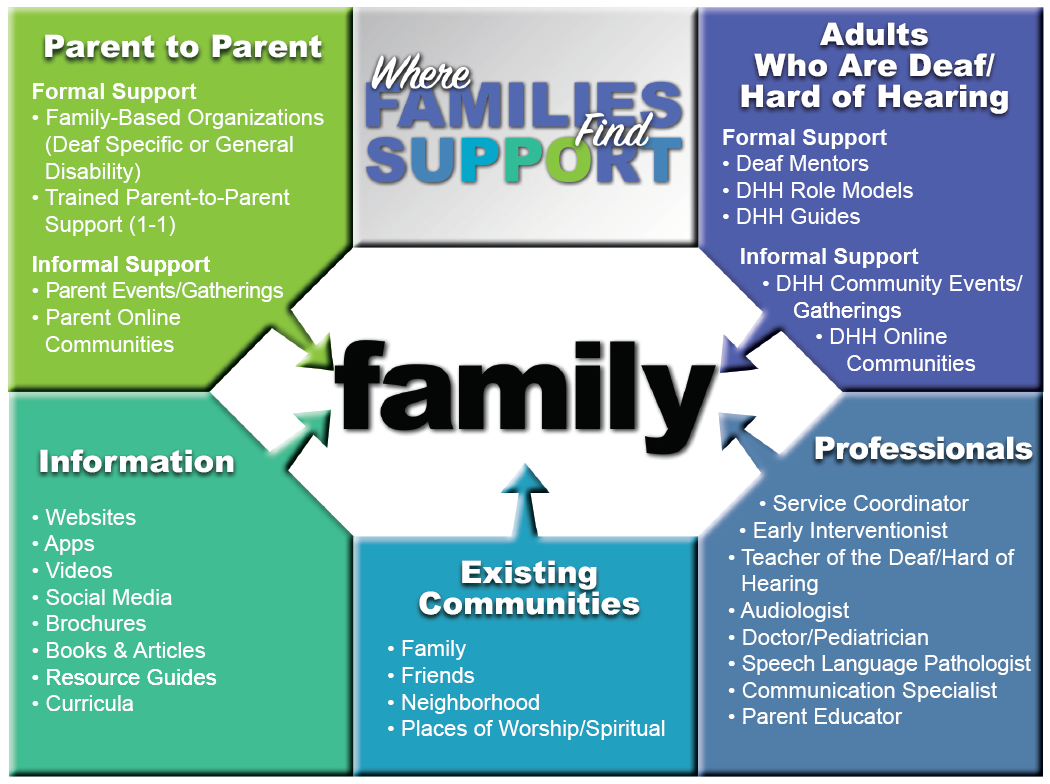
Revised Conceptual Framework of Parent to Parent Support for Parents of Children who are Deaf or Hard of Hearing: A Modified Delphi Study
In a literature review of 39 peer-reviewed articles published from 2000 to 2014, Henderson, Johnson and Moodie (2014) describe the importance of parent-to-parent support in helping to guide parents on how to advocate on behalf of their child and access special education and other services. “Peer parental support systems boost parental morale and confidence when looking toward the future at points of transition. Parents are better positioned to support the goals chosen by the child through meaningful collaboration.” The findings of this dual-stage scoping review and electronic Delphi study provide a conceptual framework that defines the vital contribution of parents in Early Hearing Detection and Intervention programs that will be a useful addition to these programs.
Download AJA Research article: Revised Conceptual Framework of Parent-to-Parent Support for Parents of Children who are Deaf or Hard of Hearing
The Supplement to the JCIH 2007 Position Statement: Principles and Guidelines for Early Intervention after Confirmation That a Child Is Deaf or Hard of Hearing
can be found here: http://pediatrics.aappublications.org/content/131/4/e1324
This Early Intervention (EI) services document was drafted by teams of professionals with extensive expertise in EI programs for children who are deaf or hard of hearing and their families. The team used literature searches, existing systematic reviews, and recent professional consensus statements to develop a set of guidelines. These comprehensive guidelines help EHDI programs establish strong Early Intervention systems with expertise to meet the needs of children who are deaf or hard of hearing. For the infant or young child who is D/HH to reach his or her full potential, families and professionals must work together quickly to build carefully designed individualized intervention in a family’s home and community. This includes engaging service providers with optimal knowledge and skill levels that fit the diverse needs of this population.
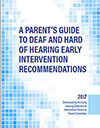
A Parent’s guide to the JCIH Supplement.
This Parent’s Guide was developed by the Early Hearing Detection and Intervention (EHDI) Parent to Parent Committee, which is made up of parents of children who are deaf or hard of hearing as well as a diverse group of professionals who support families in EI and beyond.
For more resources to share with families, explore the other sections of the FL3 Website sections and/or click here.
The EHDI System Self-Assessment Tool
The EHDI System Self-Assessment Tool was designed to assist leaders who are responsible for Early Intervention Systems after confirmation that children are deaf or hard of hearing. Although the JCIH Guidelines describe best practices in early intervention, they do not specify the exact means to identify where an organization might be in terms of achievement nor do they guide the stages of moving toward higher levels of quality. The ongoing use of an EHDI System Self-Assessment can provide a tangible means of guiding the quality drive and align partners in EHDI system improvement. The tool is intended to be used as an assessment of a state’s full EHDI system as opposed to a specific program, agency or entity. Therefore, this assessment is best completed by a team of state stakeholder, in partnership with the EHDI community and family leaders (e.g. an EHDI Advisory Committee).
Inviting a New Family to Consider Early Intervention
This guideline for Parent Guides and others supporting new families outlines a potential working script based on principles of motivational interviewing in a discussion about early intervention. The guidance covers focusing on listening/empathy and uncovering any concerns about entering early intervention and taking action when ready.
[ Download the tool - pdf ]
See a simplified version on request at parentadvocate@handsandvoices.org.

